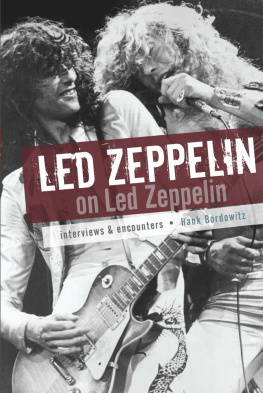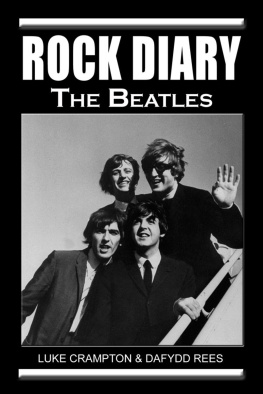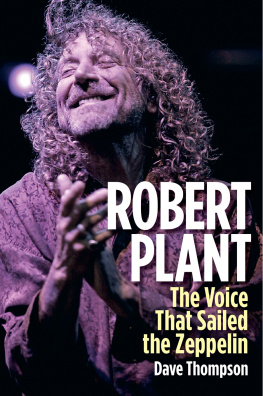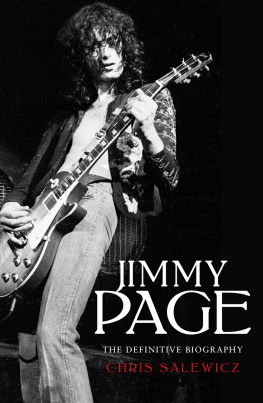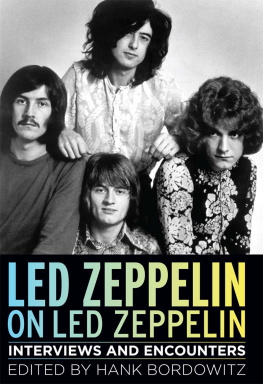ROCK DIARY
LED ZEPPELIN
Introduction
Rising from the ashes of legendary English rock band, the Yardbirds, Jimmy Page recruited fellow Englishmen John Paul Jones, Robert Plant and John Bonham to form a new quartet in 1968. A near-perfect rock fusion erupted in the form of Led Zeppelin, an uncompromising, blues-influenced hard rock combo which quickly became one of the worlds most popular acts. Endlessly creative in blending blues, folk and exotic world music flavors into their heavy rock stew, Led Zeppelins formidable musical steel was forged around the dazzling, layered riffs of Pages guitar and the primal, soulful grit of Plants vocals both underpinned by a ferocious and precise rhythm section supplied by Jones and Bonham.
The bands musical synchronicity and potential was so immediate and urgent, it released its first three albums within the space of 22 months in 1969/1970 -something unthinkable in todays cautiously scheduled music business. Showcasing a bold, hard new form of blues-rock, their first two albums included a number of blues covers (most notably several originally recorded by Willie Dixon) - each given a dynamic, thunderous update which would define the Led Zeppelin brand. While their third album introduced folk and acoustic leanings into their otherwise metallic rock, it was their untitled fourth album (latterly known as Led Zeppelin IV) which most dramatically and successfully brought their songwriting (mostly led by Page and Plant) and broad musical scope into full focus. The albums epic mix of eight muscular, multi-layered acoustic and hard rock tracks were highlighted by Stairway To Heaven, an eight-minute instant classic which defined rock radio for generations to come.
Thereafter, each successive release further pushed musical boundaries, introducing Middle Eastern influences, mythological themes and clever synthesized runs (courtesy of the ever-inventive bassist/keyboardist Jones). Between 1973 and 1979 the group recorded four more studio albums ultimately yielding a catalog of unparalleled hard rock ingenuity. Each release progressively broadened the bands own musical horizons and laid another foundation for a new music genre - Heavy Metal. Along with Hendrix and Black Sabbath, Led Zeppelin became revered as the primary movers behind Metal music, pioneering a thick, driving, loud fusion of blues, rock, psychedelia and amplified distortion.
Ultimately notching up seven US Number 1 and seven UK Number 1 chart LPs, Led Zeppelin became the biggest-selling albums band of the 1970s. Uniquely, the emphasis was on the long-player format: while a few singles trickled out in Australia and Canada, the group didnt issue 45s in their home country, and of those released in the United States only the iconic early rocker, Whole Lotta Love reached the Top 10. This simple but lucrative decision was made by the bands manager, Peter Grant. Critical to the groups success - and the cash-cow that became Led Zeppelin - Grant was a larger-than-life impresario who cut his teeth as a tour manager for American acts visiting the UK during the early sixties, before managing the Yardbirds in 1966 and then Zeppelin. His gift for exploiting the North American market began with a record-breaking advance fee for their first recording contract with Atlantic Records and by ensuring that a whopping 90% of all box-office money be paid directly to the group. Rarely giving interviews, Grants uncompromising, crafty, dictatorial and hands-on style changed rock management for ever, notably reversing the balance of power between artists and concert promoters.
Further fueling Zeppelins legend was the prowess and power of its live performance: theirs was a relentless touring schedule accompanied by a prototype on-the-road lifestyle of carefree sex, alcohol and drugs which few bands of the time could emulate. Often traveling in their own chartered Boeing 720-22 plane (frequently little more than a flying den of iniquity) the groups members embraced rock n roll excess like few others before or since. The band also indulged an interest in the occult, largely spurred by the personal curiosity of Page (and to some extent, Plant). The use of runic, alchemic symbols on album art work and on the guitarists attire were emblematic of Pages long-standing obsession (he even opened an occult book store in London).
Viewed by their still-devoted legion of fans as the greatest ever rock band, their 1970s reign as the globes most popular group yielded a powerful recording and performance legacy whose influence far exceeded their relatively short-lived 12-year existence. Each musicians talents have been much copied by subsequent artists -while collectively the group literally redefined rock. Their impact and iconic status have continued throughout the three decades since their abrupt end in 1980 when Bonham died from over-indulgence. Inducted into the Rock and Roll Hall of Fame in 1995 and receiving a Lifetime Achievement Award ten years later at the Grammy Awards, Led Zeppelin became one of only a handful of acts around whom an entire radio channel was broadcast, when Led Zeppelin Radio premiered on Sirius XM in the US in 2008. A staggering nine million applications for 18,000 tickets for a reunion concert in 2007 further confirmed their enduring presence. More confident and better rehearsed than in their two prior reunions (at Live Aid in 1985 and for Atlantic Records 40th anniversary show in 1988), the bands 16-song performance at the O2 Arena in London in December of that year gave and received a whole lotta love.
Rock Diary: Led Zeppelin presents the complete, factual backstory behind the groups success from its earliest days in the late sixties to its latter-day reunions - all detailed in the unique Rock Diary chronological style.
CONTENTS
ROCK DIARY
LED ZEPPELIN
Robert Plant(lead vocal);Jimmy Page(guitars);John Paul Jones(bass, keyboards);John Bonham(drums)
SUNDAY, JULY 7, 1968
Highly-rated British blues-rock outfit, the Yardbirds, which accrued a handful of top 10 hits between March 1965 and June 1966, plays its final gig at the Luton College of Technology in Luton, Bedfordshire before splitting. With singer Keith Relf and drummer Jim McCarty moving on to new ventures, it is left to bassist Chris Dreja and the bands most recent addition, guitarist Jimmy Page (b. James Patrick Page, January 9, 1944, Heston, Middlesex), to assemble a new lineup.
FRIDAY, JULY 19, 1968
Page, who had joined Neil Christian & the Crusaders in 1962 and has since performed as a session singer on a number of seminal 60s recordings, including hits by Jet Harris & Tony Meehan (Diamonds), Them (Here Comes The Night), Lulu (Shout), Marianne Faithfull (As Tears Go By), Dave Berry (The Crying Game) and Brenda Lee (Is It True) has been looking for recruits for a new band, and now hears from bassist, John Paul Jones (b. John Baldwin, June 3, 1946, Sidcup, Kent). Jones is a fellow session musician and arranger, with whom Page has worked in the studio - most notably on Donovans recent hit, Hurdy Gurdy Man.
SATURDAY, JULY 20, 1968
Page, Dreja and manager Peter Grant (b. April 5, 1935) travel to Birmingham, Warwickshire to see vocalist Robert Plant (b. Robert Anthony Plant, August 20, 1948, West Bromwich, Warwickshire) perform at a local teacher-training college. 19-year-old Plant is currently fronting the band Obstweedle, after recently splitting from Band of Joy - which had cut a couple of singles for CBS. He had been recommended by Terry Reid, who is Pages first choice to be lead singer. Impressed, they ask Plant down to Pages boathouse at Pangbourne, Berkshire as a prelude to joining the group.



